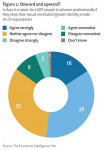Institutional investors set to increase exposure to Asia
These are among the results of a global survey of 109 institutional investors, conducted by the Economist Intelligence Unit in February 2010. The study, entitled From West to East: Gauging institutional investor attitudes to Asia, was sponsored by Fidelity International. The aim of the study was to assess the appetite among international investment managers to deepen their exposure to the Asia-Pacific region and to gauge whether, in the view of these investors, Asian financial centres are in a position to overtake their Western counterparts.
The survey’s key findings include:
· Allocations to Asia are set to increase on confidence in Asia’s long-term growth potential. China and India will attract the most significant new capital flows over the next year, with 58% of respondents planning to increase their allocation to the former, and 47% to the latter. Few see growth in the region as a flash in the pan: just 21% of respondents think that the Asian growth story has been over-hyped, nearly the same number who think the region’s recovery from the recent crisis is a product of fiscal expansion and is therefore not sustainable.
· Investing in Asia is seen as risky, but balanced by potential rewards. A majority of respondents say that investing in asset classes in Asia such as equities, real estate, alternative assets and currencies is riskier than similar investments in Western markets. The exceptions are bonds and government debt, where a majority believes that the risks are equivalent or lower. Some 54% of respondents also agree that Asia is more prone to asset price bubbles than the West. However, respondents also believe that the rewards more than compensate for the risks. The majority believes that returns are greater across all asset classes in Asia than with equivalent investments in Western markets, with government debt the only exception to this view.
· Uncertainty about institutional expertise in Asia does not necessarily equal caution. A lack of knowledge and expertise about Asian markets is seen as the most significant reason, along with concerns about political stability, preventing institutions from investing in the region, cited by 32% of respondents. But a lack of understanding does not automatically lead to a cautious approach. Among those respondents who cite a lack of knowledge and expertise as a barrier to further investment, 46% say that they are increasing allocation to China, and 31% to India, suggesting that some institutions could be raising their exposure to Asian markets without having the appropriate knowledge and expertise in place.
· Concerns linger about transparency and the quality of regulation. Despite seeing significant opportunities, international portfolio investors continue to worry about a lack of transparency in Asia. Notwithstanding the huge variation between countries, from the relatively high levels of transparency and disclosure in Hong Kong to the more restrictive and opaque nature of investing in China, 61% of respondents see transparency as the main barrier to the development of financial centres in the region. The quality and rigour of regulatory infrastructure in Asia follow close behind in their list of concerns.
· Asian financial centres are unlikely to overtake New York or London in the foreseeable future. Despite confidence in the skills of local market participants and in the markets' increasing sophistication, just 24% of respondents think that Asian financial centres, such as Hong Kong and Shanghai, will supersede their Western counterparts, such as London and New York, in size and importance within a decade. Even among respondents based in Asia-Pacific, who might be expected to be most confident of a change in the guard, just 39% agree with that statement.
About the survey
In February 2010 the Economist Intelligence Unit surveyed 109 financial services professionals across the world. All respondents had knowledge of their institution’s overall investment strategy and exposure to assets in Asia. Investment banks formed the largest group, with 44% of respondents, while insurance companies accounted for 14%, mutual funds for 13%, and pension and retirement funds for 12%. Just over half of the respondents were based in Western Europe, and just under half were based in Asia-Pacific. (Respondents from North America were excluded, although respondents from institutions headquartered in this region accounted for 14% of the total). Around 50% of respondents represented institutions with global assets in excess of US$50bn.
About the Economist Intelligence Unit
The Economist Intelligence Unit is the business information arm of The Economist Group, publisher of The Economist. Through our global network of more than 650 analysts and contributors, we continuously assess and forecast political, economic and business conditions in more than 200 countries. As the world's leading provider of country intelligence, we help executives make better business decisions by providing timely, reliable and impartial analysis on worldwide market trends and business strategies. For more information, please visit www.eiu.com. Follow us on www.twitter.com/theeiu
About Fidelity International
Fidelity International provides investment products and services to individuals and institutional investors outside of the Americas, ranging from mutual funds and defined contribution pensions, to segregated portfolios and multi-manager products. Fidelity International has been in Asia for 40 years, employs over 4,000 people globally and has offices in 23 countries including Japan, Korea, Australia, Hong Kong, Taiwan, Singapore and China. Fidelity International is responsible for managing client assets of US$210 billion as of 30 December 2009 and has one of the largest proprietary research teams in the world, providing insights into around 90% of the world's stock markets as measured by the Morgan Stanley Capital International World Index. www.fidelity-international.com
웹사이트: http://www.eiu.com
연락처
Joanne McKenna
+44 (0)20 7576 8188
이메일 보내기
이 보도자료는 Economist Intelligence Unit가(이) 작성해 뉴스와이어 서비스를 통해 배포한 뉴스입니다.




